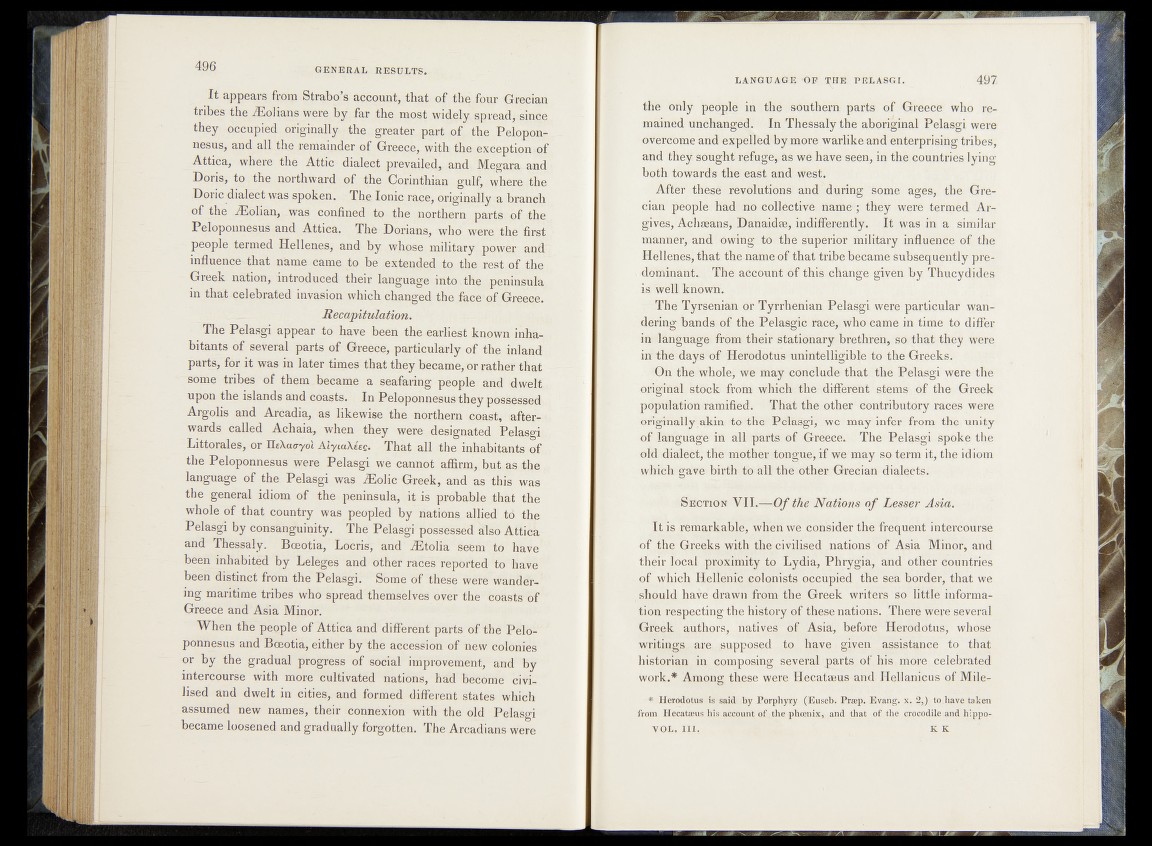
I t appears from Strabo’s account, that ol'thq.fpur Grecian
tribes the iEolians werebydar the mps.t widely ap read^sjnie
th e ^ occupied originally the greater p a rt "of. the Pelqpom
nesus, and all .the remainder of Greecer yith th^exception-of
_Attica, where the Attic dialect prevailed, and Megara and
Doris, tp the northward of the Corinthian . gulf, where the
Doric dialect was spoken. The Ionic race,‘originally a branch
of the J£olian,..was confined to the northern parts- of the
Peloponnesps.and Attica, The Dorians, whpfwere the first
3 people termed Hellenes, and by whose, military power and"
influence-that name came to be extended to the* rest of th e ;
- Greek nation, introduced their language into ..theygequjtsuia
in that celebrated invasion which changed thejfj^e^jGreeoe.
Recapitulation.
The Pelasgi appear to have been. the earliest known inhabitants
of several parts of Greece, particularly of th^,inland
parts, for it was in later times that they became, or rathef that
“ some tribes of them became a seafaring people and dwelt
upon the islands and coasts. In Peloponnesus they possessed
Argolis and Arcadia, as likewise the northern .cpast, Mafter- *
wards called Achaia, when they were designated., Pelasgi,..
Littorales, or neXaeryol AtytaXleg. That all the inhabitants of
the Peloponnesus were Pelasgi we cannot affirm, but as the
language of the Pelasgi was iEolic Greek, and as this was
the general idiom of the peninsula, it is probable that the
whole of that country was peopled by nations allied to the
Pelasgi by consanguinity. The Pelasgi possessed-also Attici
and Thessaly'. Bceotia, Locris, and iEtolia sefcmVto' have
been inhabited by Leleges and other races reported to have
been distinct from the Pelasgi. Some of these were wandering
maritime tribes who spread themselves over the coasts of
Grefece and5 Asia Minor.
When the people of Attica and different parts of the P llb - ' f
ponnesus and Bceotia) either by the accession of new colonies
or by the gradual progress of social improvement, and by
intercourse with more cultivated nations, had become civilised
and dwelt in cities, and formed different states which
assumed new names, their connexion with the old Pelasgi
became loosened and gradually forgotten. The Arcadians were
LANGUAGE OF THE PELASGI. 497
the only people in the southern parts of Greece who remained
unchanged. In Thessaly the aboriginal Pelasgi were
overcome and expelled'by more warlike and ènterprising tribes,
and thejtéöü^tó' rëfoge^#we have seen, in t|||$ o u n tries lying
both towards the east and West.
After these' revoluiSbks, and during some ages, the Gre-
ciaV peopleihasd; no c'Olléctivê. naröe^' they were termed Ar-
gives, Achmans, Dahaï4m> iiïdifieiently. It Was in a similar
ma^ner’^ a n d 'owMgfitó thé supëHbr military influence of the
Hellenes^ that the name of that trihe beOame1 subsequently predominant.
, The account óf this pp&nget gïyèn by Thucydidea
is well known.
The Tyrsenian or Tyrrhenian Pelasgi were,particular wandering
b a n d s t h e Pelasgic race,- who came in time to differ
in language from their stationary brethren, sé that they were
inHhe days of Herodotus unintelligible to the Greeks“.*
On the whole, we may conclude that ,the Pefasgi were the
ori^iMl stock from which the different steins of the Greek
population ramified. - That the other contributory races were
originallynkin to the Pelasgi, we may infer from the unity
of language in all parts of Greece. The Pelasgi spoke the
old dialëót, the mother dongue, if we may sq term it, the idiom
whicb’gaVe birth do all the other Grecian dialects.
S e c t io n the Nations o f Lesser Asia. ■
It is remarkable, when we consider the frequent intercourse
of the Greeks with the civilised nations of Asia Minor, and
their local proximity to Lydia, Phrygia, and other countries
of which Hellenic colonists, occupied the sea border, that we
should have* drawn from the Greek writers so little information
respecting the history of these nations. .There were several
Greek authors,. natives of Asia, before Herodotus, whose
writings . are supposed to, have givenk d is ta n c e to that
historian in composing several parts of his more celebrated
work.* Among; these were Hecataeus and Hellanicus of Mile-
* Herodotus is said by Porphyry (Euseb. Praep. Evang. x. 2,) to .have taken
from Hecatasus his.account of .the phoenix, and that of the crocodile and hippo-
VOL. III. E K